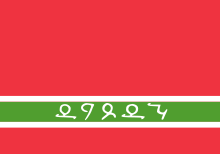This article possibly contains original research. (August 2024) |
 Flag used by the Lezgin people | |
 | |
| Total population | |
|---|---|
| <1 million[1] | |
| Regions with significant populations | |
| 488,608[2] | |
| 167,570[3] | |
| Languages | |
| Lezgin | |
| Religion | |
| Sunni Islam[4][5][6] | |
| Related ethnic groups | |
| Other Northeast Caucasian peoples, especially Aghuls, Tsakhurs, Tabasarans, Udis, and Rutuls | |
Lezgins (Lezgian: Лезгияр[7] IPA: lezgijar) are a Northeast Caucasian ethnic group native predominantly to southern Dagestan, a republic of Russia, and northeastern Azerbaijan, and speak the Lezgin language. Their social structure is firmly based on equality and deference to individuality. Lezgin society is structured around djamaat (Lezgian: жамаат- unions of clans) and has traditionally been egalitarian and organised around many autonomous local clans, called syhils (сихилар).
The land of the Lezgins has been subject to multiple invaders throughout history. Its isolated terrain and the strategic value outsiders have placed on the areas settled by Lezgins has contributed much to the Lezgin community ethos and helped shape its national character. Due to constant attacks from the invaders, the Lezgins have developed a national code of honor and conduct, Lezgiwal, passed down from generation to generation by parents and society. It implies moral and ethical behaviour, generosity and the will to safeguard the honor of women.
- ^ "Lezgin". Retrieved 2024-06-24.
- ^ a b "Национальный состав населения Российской Федерации согласно переписи населения 2021 года" (in Russian). Archived from the original on 2022-12-30. Retrieved 2023-01-05.
- ^ "Azərbaycanın əhalisi" (in Azerbaijani). Retrieved 2024-06-06.
- ^ Koter, Marek; Heffner, Krystian; Sobczyński, Marek (2003). The Role of Ethnic Minorities in Border Regions: Forms of their composition, problems of development and political rights. University of Lódź, Department of Political Geography and Regional Studies. ISBN 9788371261749. Retrieved 18 December 2014.
Although the Lezgin are Sunni Muslims, there is a strong Shiite minority.
- ^ Friedrich, Paul (1994). Encyclopedia of World Cultures: Russia and Eurasia, China. G.K. Hall. p. 243. ISBN 978-0816118106.
Given the strong Azerbaijani influence on them, however, there is a sizable Shiite minority among the Lezgins
- ^ Cole, Jeffrey E. (2016). Ethnic Groups of Europe: An Encyclopedia: An Encyclopedia. ABC-CLIO. p. 237. ISBN 978-1598843033.
The Lezgins are Muslims; the great majority are Sunni of the Shafi'i rite, with small numbers of Lezgins living near or inside Azerbaijan being Shiite.
- ^ |title=ЯЗЫК И ОБЩЕСТВО/ЭНЦИКЛОПЕДИЯ. — ИЯ РАН, Москва, 2006. — С. 253.